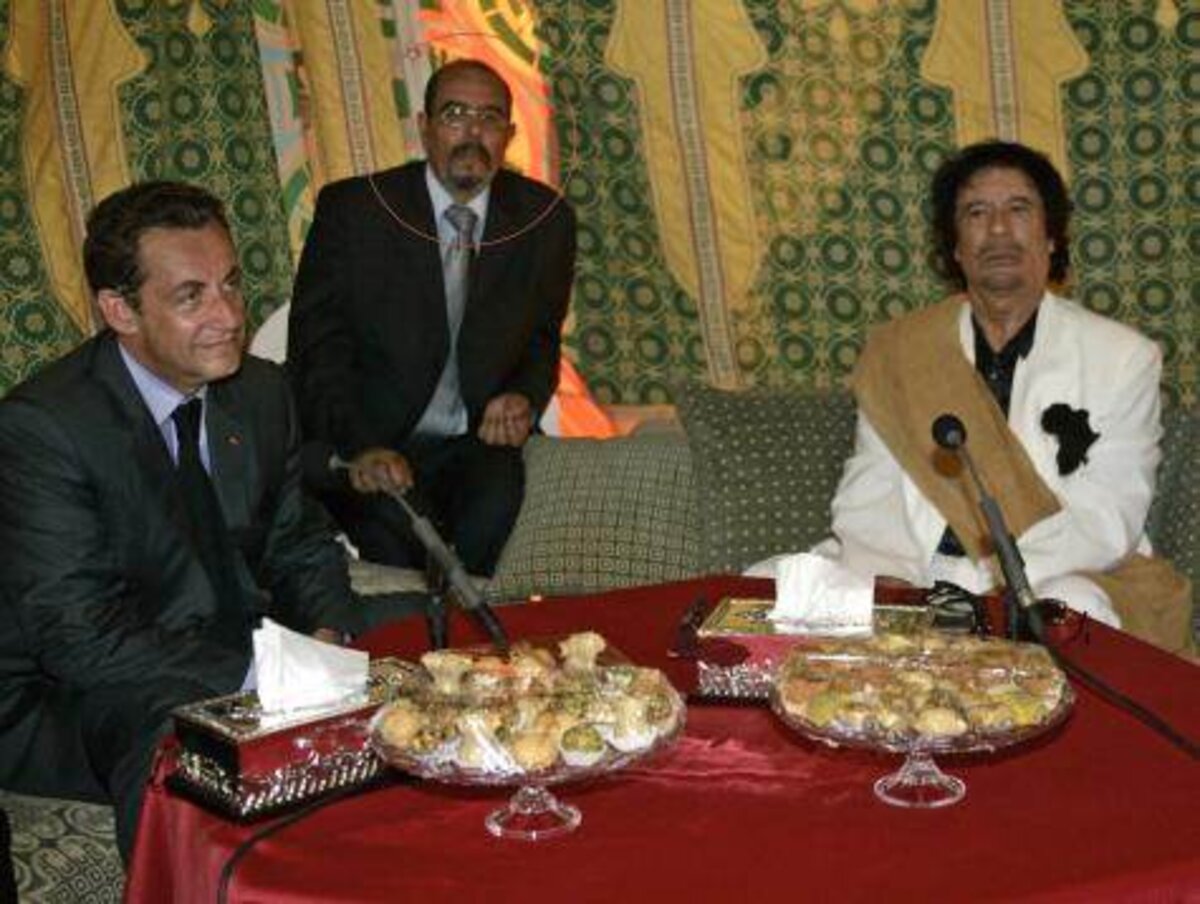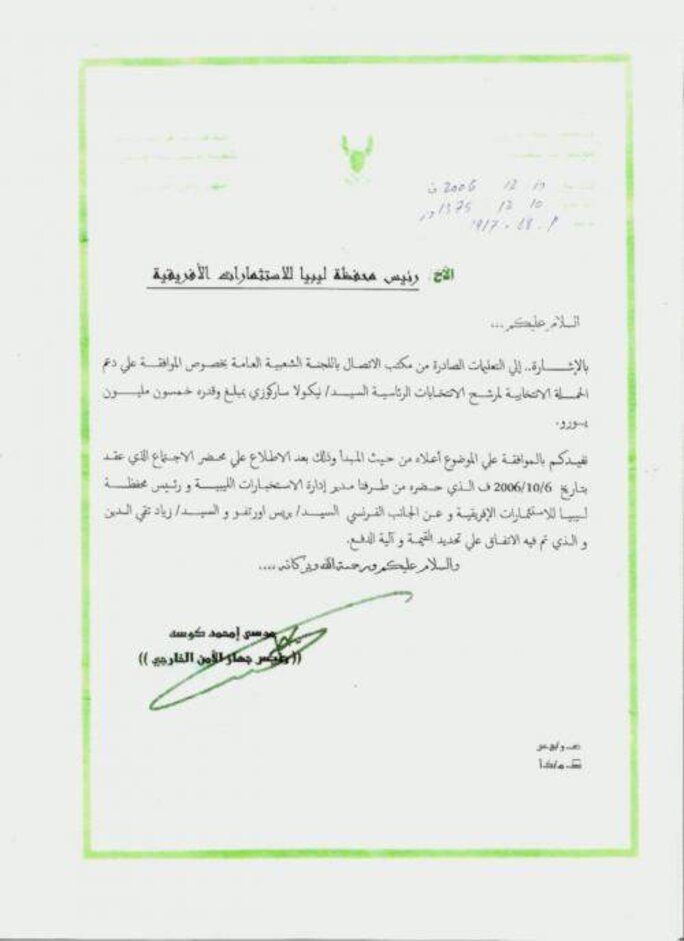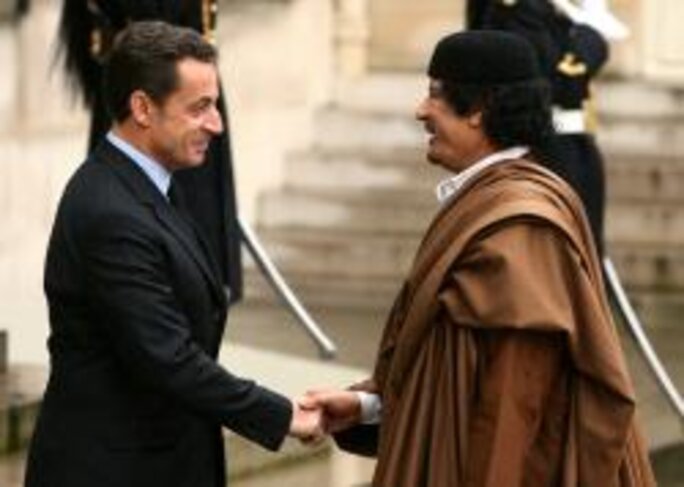A senior aide to the late Libyan dictator Muammar Gaddafi has revealed that Gaddafi personally told him that his regime illegally funded Nicolas Sarkozy’s 2007 election campaign to the tune of 20 million dollars.
Moftah Missouri, who was Colonel Gaddafi’s personal interpreter, who was given the rank of ambassador and who also served as a minister in the regime, made the disclosure in an interview with French state television channel France 2, and which is broadcast Thursday evening.
Missouri, fluent in French, was present as the official interpreter in head-to-head meetings between Gaddafi and Sarkozy.
During the interview for current affairs programme Complément d’enquête, Missouri also confirms the authenticity of a document published by Mediapart on April 28th 2012 in which the Gaddafi funding of Sarkozy’s campaign is detailed (see links to more articles at the bottom of page 2).

The document, which survived the bombing of Libya during the bloody overthrow of Colonel Gaddafi in 2011, was a letter signed by the then-head of Libya's foreign intelligence agency, Moussa Koussa, and dated December 10th 2006. It set out how the Gaddafi regime had agreed to “support the electoral campaign” of Sarkozy for the 2007 presidential elections, and for the “sum of fifty million euros”.
The letter also states that an agreement on “the amount and method of payment” had been reached at a meeting two months earlier (for a translation of the complete text, click 'Prolonger' tab at the top of this page).
It was addressed to Gaddafi's chief of staff, Bashir Saleh, then president of the Libyan African Portfolio (LAP), one of the main investment arms of the regime, and who was in charge of supervising the payments.
After the fall of Gaddafi, Saleh lived in exile in France under the close protection of the domestic intelligence services, the DCRI.
During the interview with France 2, held at a Tripoli hotel on June 15th, Missouri analyses the letter published by Mediapart and comments: “That is the outline document, if I dare say so, for the financial support of the presidential campaign of President Sarkozy.”
“It's a genuine document,” he concludes. “There is, first of all, the signature. There is also the person who initiated the letter.”
Moftah Missouri, who remained by Gaddafi’s side until the fall of the regime in 2011, was a witness to the threats made by several Libyan officials towards Sarkozy to expose what Gaddafi himself described as a “grave secret”. Gaddafi’s son, Saïf al-Islam, made specific accusations in an interview with television channel Euronews just days before the NATO-led military intervention in Libya to help rebels depose the dictator.

Enlargement : Illustration 3

Asked his opinion of Sarkozy, Saïf al-Islam answered: “Sarkozy must first give back the money he took from Libya to finance his electoral campaign. We funded it and we have all the details and are ready to reveal everything. The first thing we want this clown to do is to give the money back to the Libyan people. He was given assistance so that he could help them. But he’s disappointed us. Give us back our money. We have all the bank details and documents for the transfer operations and we will make everything public soon.”
In the interview with France 2, Missouri says: “Even Gaddafi told me, verbally, that Libya had paid some 20 million dollars. Normally, here, at the presidency, when one gives money to someone there is no bank transfer, there's no cheque, it's cash in briefcases.”
Questioned by Mediapart, France 2 journalist Tristan Waleckx, one of the Complément d’enquête team, gave further details of the interview. “We asked him the question 15 times,” said Waleckx. “He is cautious regarding the effective payment of the money because he did not see the briefcases. But regarding the document, he expresses not the slightest doubt regarding its presentation, its wording, the writing and the signatures.”
Funds 'transferred to Switzerland'
Waleckx said Missouri denies ever having contested the authenticity of the document, as was previously claimed by French daily Le Figaro. “Missouri told us that Le Figaro had extrapolated his words,” said Waleckx. “Because he’s someone who is cautious, he said he hadn’t seen the briefcases, and it became a formal denial [of the veracity of the document]. For him, it was a deformation by Le Figaro of what he said, cut at the appropriate point."
The judicial investigation was prompted after a police search on February 27th of the home of Claude Guéant, a close political ally of Sarkozy and who served as his chief-of-staff when Sarkozy was both interior minister and candidate for the presidential elections in 2007. Guéant was closely involved in Sarkozy’s dealings with the Libyan regime, notably in organizing a visit by Sarkozy to Tripoli to meet Gaddafi in 2006.
After Sarkozy’s election as president, Guéant became his presidential chief-of-staff.
According to a report by French weekly L’Express last month, during the raid on Guéant’s home police seized “written notes on interior ministry-headed notepaper” referring to dealings with the Libyans.

Mediapart has previously published the contents of secret documents written by Paris-based businessman and arms dealer Ziad Takieddine which detail the lengthy contacts between Sarkozy’s staff and the Libyans in 2005 and 2006. Takkiedine, who reported to Guéant, was a key advisor to the latter in his contacts with Tripoli and in organizing Sarkozy’s 2006 meeting with Gaddafi. Takieddine's name is cited in Mousssa Koussa's 2006 letter outlining the agreement to fund Sarkozy's campaign.
The secret documents clearly suggest that the relations with the Libyan regime involved a confidential, although unspecified, deal which was to be discussed during talks officially centring on defence and security contracts.
Takieddine, who holds dual French and Lebanese nationalities, was last year placed under formal investigation - one step short of charges being brought - for “misappropriation of company assets and funds” as part of his suspected role in the illegal financing, via French arms sales to Pakistan and Saudi Arabia, of former French prime minister Edouard Balladur's 1995 presidential election campaign. Nicolas Sarkozy was Balladur's budget minister and, in 1995, his presidential campaign spokesman.
Takieddine, whose passport was confiscated by judges leading the investigation, was last month jailed after it was discovered he had secretly acquired a diplomatic passport from the Dominican Republic.
Apart from Bashir Saleh, who is now living in exile on the African continent, and Moussa Koussa, who found refuge in Qatar, the three other key witnesses to the Gaddafi funding case are all in the hands of the Libyan authorities. These are Gaddafi’s son Saïf al-Islam, former Libyan Prime Minister al-Baghdadi al-Mahmoudi and Gaddafi’s former intelligence chief Abdullah Senussi.
In 2011, al-Baghdadi al-Mahmoudi was detained in Tunisia to where he had fled from Libya following Gaddafi’s overthrow. He was extradited back to Tripoli in 2012, in compliance with a demand from the new Libyan authorities. While he fought the case in the Tunis appeals court, he testified at a hearing that “as prime minister I supervised the dossier of the financing of Sarkozy’s campaign from Tripoli”, adding: “Funds were transferred to Switzerland, and Nicolas Sarkozy was grateful for this Libyan help and stopped repeating that to certain intermediaries.”
During a press conference on July 18th 2012, newly-elected President François Hollande was asked to comment on al-Baghdadi al-Mahmoudi’s extradition from Tunisia to Libya. Hollande said he regretted the move, adding that there was “certainly information to be had that would be useful”.
In an interview last September with French weekly Le Point, Mohamed Youssef el-Megarief, who in May 2012 had resigned as president of the new Libyan authorities, was asked his opinion on whether Gaddafi had funded Sarkozy’s campaign. “That does not seem to me impossible,” he replied.
A former foreign intelligence official for the post-Gaddafi National Transition Council, Rami el-Obeidi, last year claimed that Gaddafi was executed by a French agent after surviving a lynch mob in Syrte on October 20th 2011. He told Mediapart that Gaddafi’s killing was linked to “the threat of a revelation of financing of Sarkozy’s campaign in 2006 and 2007”.
In an interview with journalists from the Italian newspaper Corriere della Sera and Briton's The Daily Telegraph el-Obeidi told how NATO forces had obtained the coordinates of Gaddafi's location by keeping watch on his Libyan contacts in Damascus.
“The Syrian president [Bashar al-Assad] himself gave Gaddafi's satellite phone number to French agents,” he told Corriere della Sera. And el-Obeidi told The Daily Telegraph that the capture and death of Gaddafi was “an exclusively French operation”.
-------------------------
- The complete interview with Moftah Missouri is broadcast at 10.15 p.m. June 20th in 'Complément d'enquête' on France 2.
-------------------------
See also:
Gaddafi funding of Sarkozy election campaign: the proof
Exclusive: secret report describes Gaddafi funding of Sarkozy's 2007 election campaign
Exclusive: how Sarkozy's team sought grace for Gaddafi's murderous henchman
Exlusive: how President Sarkozy's team dealt with Gaddafi
French IT group Bull horned by libyan internet espionage deal
The French-built stealth offroader that may be hiding Gaddafi
The Sarkozy aide and his secretly-funded Colombian mansion
French political funding scandal reveals a tale of two 'Titty's
Exclusive: British witness in French funding scandal hits back at ‘protected’ arms dealer
British divorcee becomes key witness in French political funding scandal
Net closes in on French presidency after funding 'scam' arrests
Arms dealer probe brings illegal funding scandal closer to Sarkozy
Judges step up hunt for the phantom figure behind the Karachi Affair
The arms dealer and his 'friendly' services for UMP leader Copé
French judge finds key evidence in illegal funding probe
The British thriller writer caught in the plot of the Karachi affair
The secret financier who brings danger to the Sarkozy clan
Sarkozy, the arms dealer, and a secret 350 million-euro commission
The well-connected arms dealer and his tax returns
How Sarkozy aides saved arms dealer from paradise island 'death blow'
The arms dealer and his Paris party for the glitterati
When Total paid the bill for the Elysée's secret emissary
How French intelligence shields the Sarkozy clan's unofficial emissary
Divorce court freezes arms broker's assets
A Q&A guide to the Karachi affair
How the Karachi affair caught up with Nicolas Sarkozy
Senior French defence chief told of former PM's 'kickback scam'
-------------------------
English version by Graham Tearse


